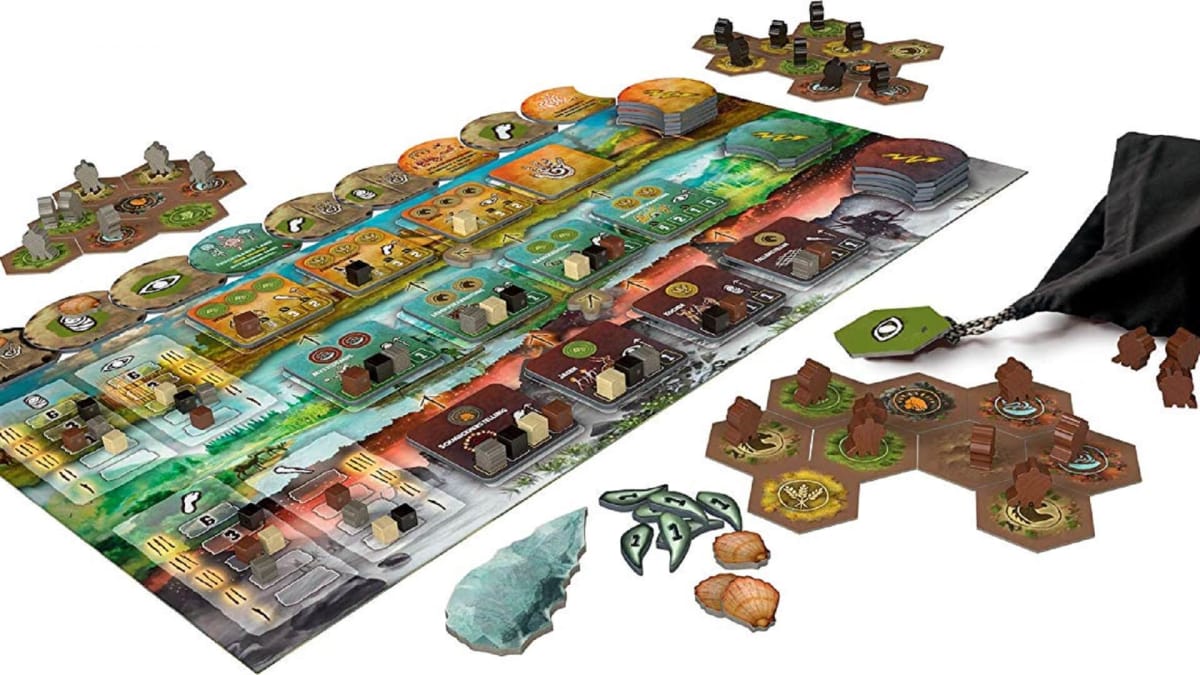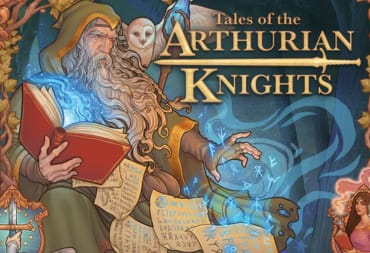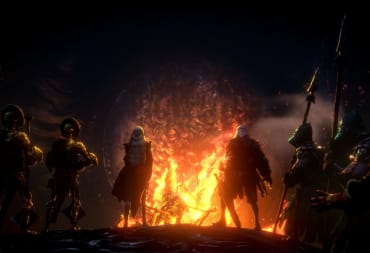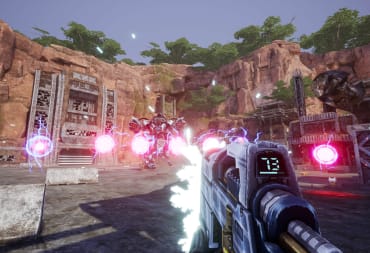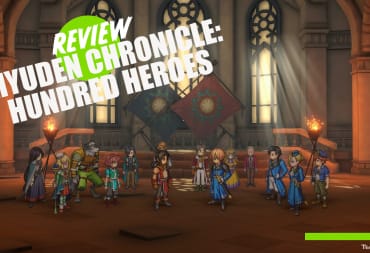Going into any boardgame it's great to know how it sets up and how to play, but what will dictate a lot of play is "How do I win?" In Monopoly, it's all about the money, that's something that makes sense to us. In a Co-operative game, it's normally about achieving an end goal, some kind of success as a team. In competitive games where players earn points it's all about efficiency and maximization. This is especially so when there are many avenues of scoring. How can I earn points the fasters and get ahead of my opponents? How to earn points, and what is the best use of time is something that Tribes: Dawn of Humanity pushes the player to discover.
The premise for Tribes is that each of the four players is trying to build their tribe up to be the strongest. The tribes are able to progress through the late Paleolithic period, Neolithic Age, and into the Bronze Age. Unlike an early tribe that's all about how big and strong you can be there are many avenues that you'll be working to develop your tribe. Your tribe can grow for a variety of reasons; new tribe members, the collection of land and resources, and through achievements. Over the game your tribe will get propelled them through the ages from early man of 30,000 BCE to 800 BCE. While there isn't too much reflected in the game that will inform players of anything educational to do with these periods it lays out a great setting for the events and what people could have experienced during those times.
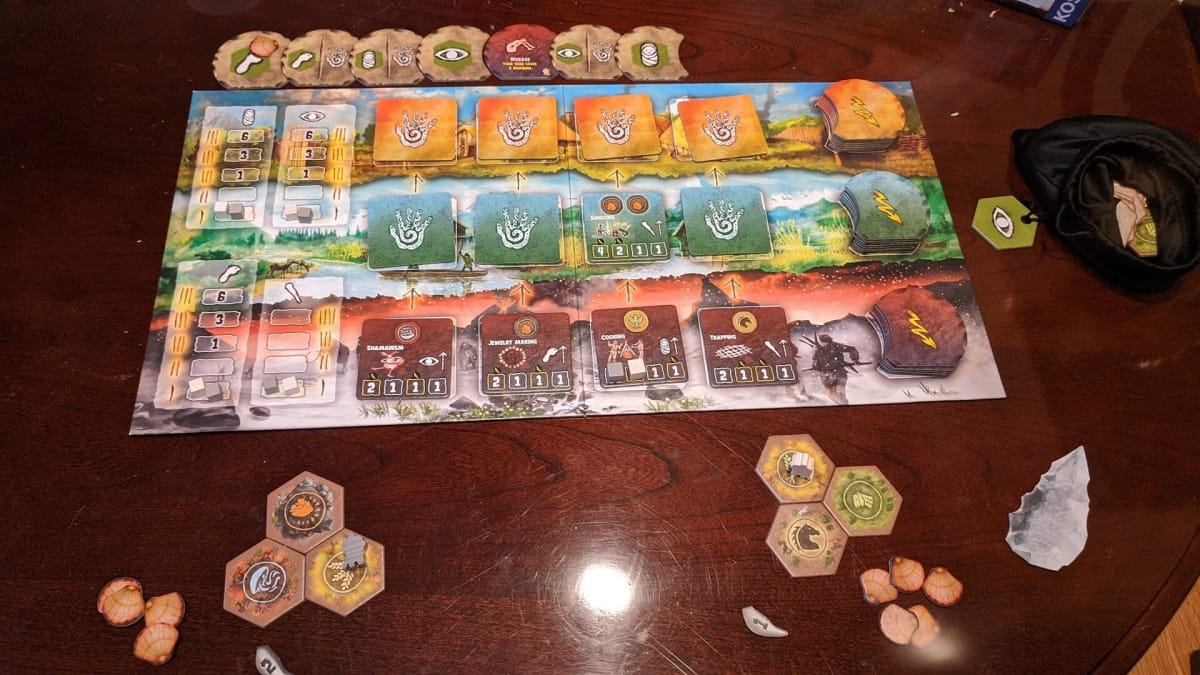
Each of the eras's that the tribes develop through get represented by a different bar on the gameboard. Each player will start with three unique land tiles, representative of resources. You start with unique land tiles to ensure they don't get locked out of anything in the early game. They'll start with their one tribe member on a Land Tile. The tribes begin weak and so only have limited ability to procreate, explore, move or attack. Each player receives five Shells, and 1 Bear Tooth, the main currency, depending on player numbers.
Different Achievements get laid out on the board, these are color co-ordinated according to which era they belong to. Starting at the bottom players will see early achievements that their tribes can begin making. Examples of these could be hunting, cooking, and jewelry making. The later achievements will only get revealed after the previous one has gotten earned a player. This stops players from planning too far ahead at what resources they should be looking to build up. There is also a cheat arrow that each player has, they can play this to create a diagonal bridge between achievements. This adds an element of randomness and while benefiting the main player could also assist others. Depending on the Achievements that get revealed they can really help, or hurt existing players. In some games after needing two Wheat resources to unlock an achievement, the next one revealed needed three wheat. There was a fast conclusion to that game but if resources are revealed that no player has access to then you'll see a higher demand for the explore events.
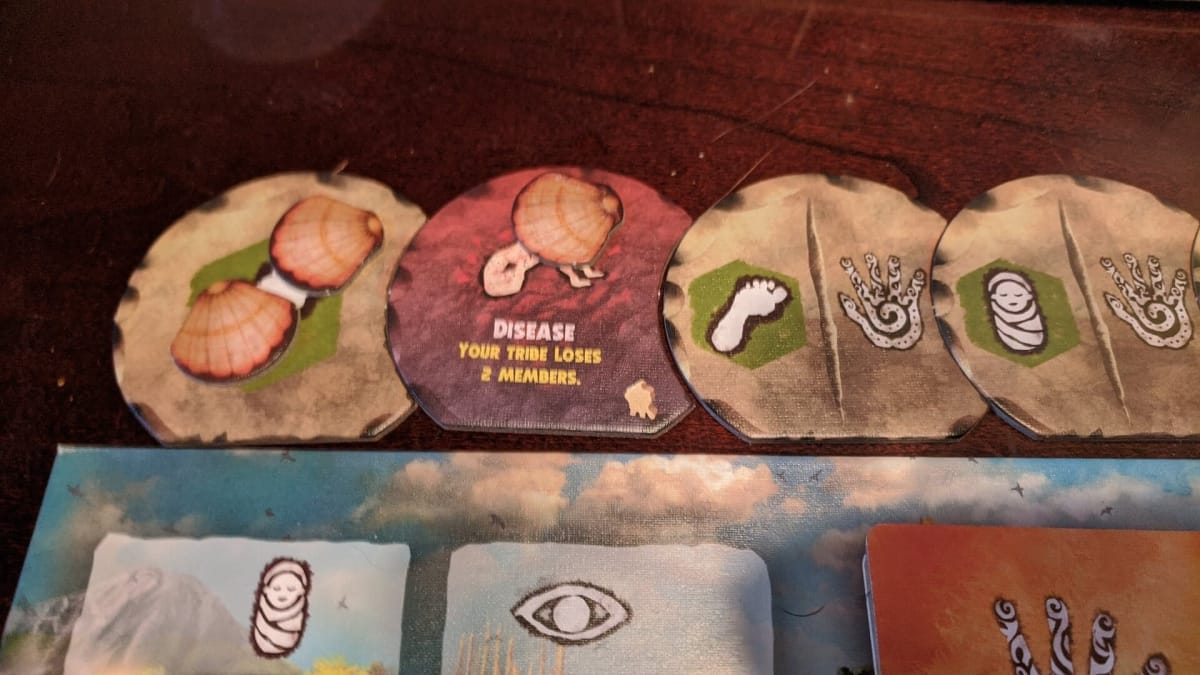
The player who is strongest as dictated by early Paleolithic law (oldest) is the one that gets the Starting Player Marker. At the top of the board will be a series of Action Tiles. These will dictate what a player is able to do with their turn. There are two tiles for each of the actions a player might be able to complete in their turn; Procreate, Explore, and Move. The duplicate action tile will also have a palm symbol, this means that if you get this action you can choose instead to complete an achievement. Procreate will allow you to earn another tribe member, Explore allows you to collect more land pieces, and Move lets you move a tribe member from one Land Tile to another. How much you do of this action is determined by the Progress Tracks on the side of the board. Each turn has a dedicated purpose, players need to know what their objective is before seeing what is available to them. Progress will begin slow as you get one tribes member or only move one space at a time but every step is towards more achievements and more growth.
The player must complete the first action on the left, unless they are willing to spend one of their five shells, each get used to skip an action and do the next one instead. A player can leave a shell on each one they pass for as many shells as they have. If you want to get to that Procreate tile before the next player does, or if there's an achievement you've had your eye on you can jump the line to get there. Alternatively, if a player decides to take an action that there has been a shell buildup on then they get to collect them. This is the only part of the game where you have the ability to really affect other players. Either by claiming an action you know that they want, or having enough shells to continue avoiding a negative event. This can also be a tough call whether you want to hinder your opponent, or just keep heading towards your own success. After any action has been completed it will go to the end of the queue and the next action will be up.
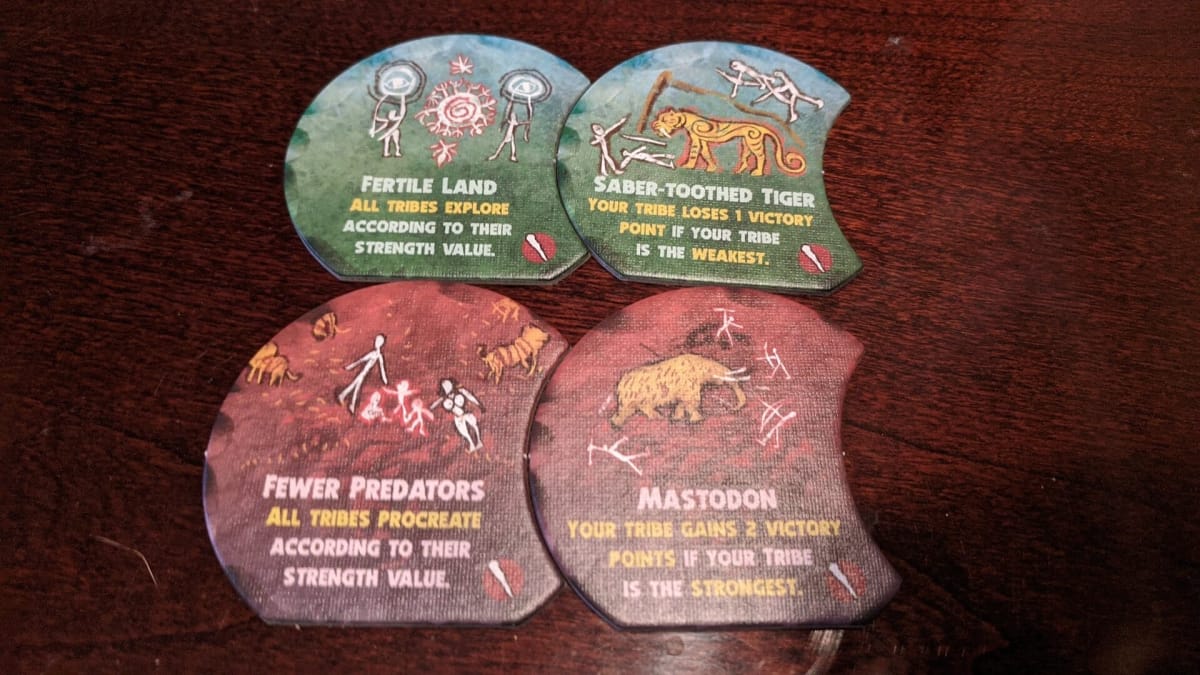
In order to make progress on any of the achievements on the board you need to have a tribesman standing on the resource shown on the achievement and they need to land on the action that has the palm symbol. At that point they can mark their achievement on the board by placing tokens on it starting on the left of the four spaces. You'll earn Bear Teeth of the corresponding value, progress in the symbol on the achievement and if it hasn't been revealed, the next achievement will be flipped. Earning these achievements helps you in a lot of ways and you'll begin to really see the effects of strengthening your tribe through completing them. As your progress improves you can move more characters, get more lands, and be able to create more new tribesmen. Through each age you'll get more and more resources so balancing earning achievements with expanding your land and tribe is important.
If the achievement you earn has a lightning bolt over the point amount then you get to add an event to the running order of actions at the top of the board. No longer do you just have the six options to perform or use your shells to skip. Instead, the events that come down the board could be something beneficial to the player such as Fewer Predators or even something that sets every player back. When completed these events are just discarded but on the third tier, the Bronze Age, the game will end depending on how many of these events have been completed. When as many Bronze Age events have been resolved as there are players in the game the next time the turn order reaches the Starting Player marker the game is over.
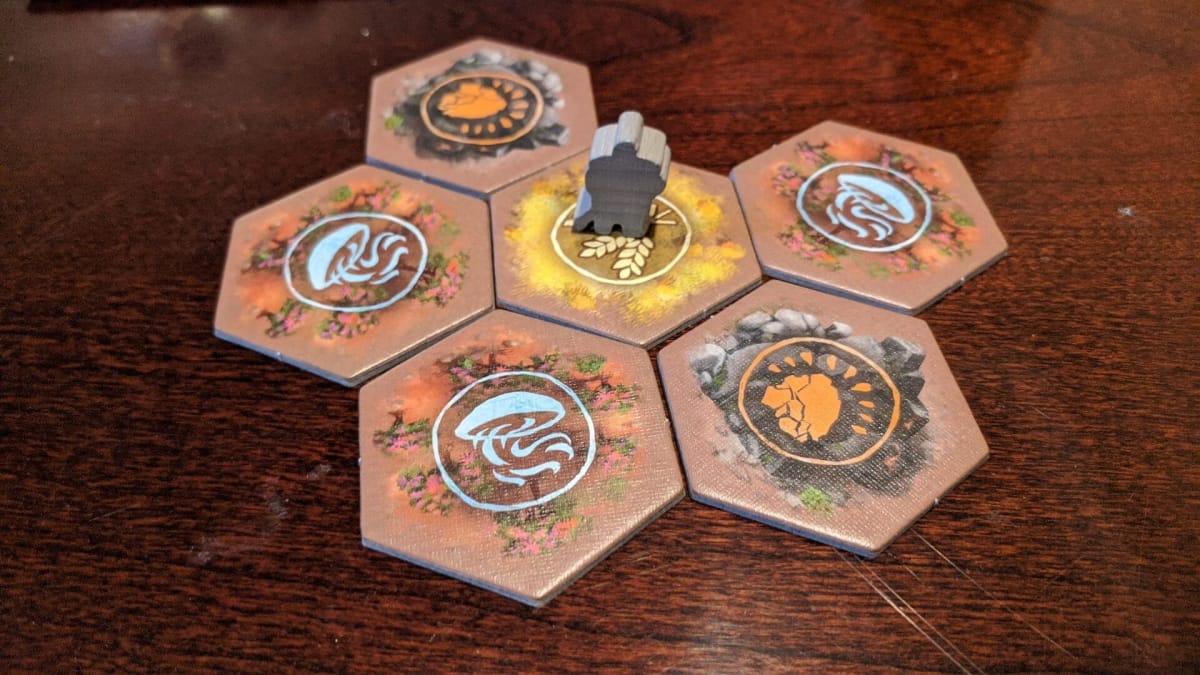
This is the point where players will tally up their points earned throughout the game. This is the step that you can start to balance out where it was worth spending your time. Points can be earned from how far you were in the Progress Tracks and how many Bear Teeth you had. There are also bonus points awarded to the player with the largest tribe, and the player who has the most land tiles. With only a few points being thrown to players for bonuses that would be counteracted by even a Tier 1 achievement it's easy to say the player might get distracted trying to build the biggest tribe but instead the focus is on the achievements.
The Bottom Line:
Tribes: Dawn of Humanity has a lot of moving parts to it. Any action you want to take can be dictated by the actions coming up in the rotating order or whether you're able to pay to avoid them. Once those basic rotations are understood though players will begin to roll through the game with incredible speed. From the initial play taking an hour and a half the second play only took my group of three 45 minutes. While there's no overly antagonistic element for it to just be a board game to play when you're in the mood for a board game it perfectly fits the description.
Get this game if:
- You're up for a new but not complicated experience
- You want something for any ages
- Interested in the development of man
Avoid this game if:
- You want to antagonize your friends
- You're looking for something special
Review Summary
Have a tip, or want to point out something we missed? Leave a Comment or e-mail us at tips@techraptor.net
